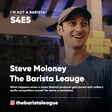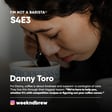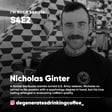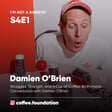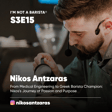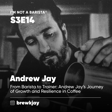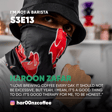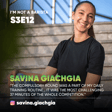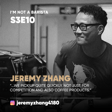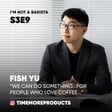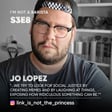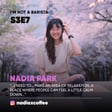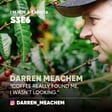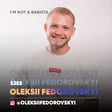Introduction to Podcast
00:00:06
Speaker
Welcome to the I'm Not A Barista podcast. We're here to talk about all things coffee from industry careers, brewing tips, community support and more with some really incredible people who love coffee as much as you do. We hope their stories inspire you because humanity runs on coffee and together we can empower all the people behind every cup.
Meet James - Full-Time Podcaster
00:00:31
Speaker
So, James, welcome to our podcast. I'm not very surprised. And you're a podcaster, right? Full-time? Full-time podcaster. Thank you so much for inviting me. This is great. Great to meet you. Great to connect with you. So tell us more about yourself and how did you start your podcasting career?
00:00:49
Speaker
Oh, my goodness. Well, I don't know. So I create a podcast called Filter Stories, which are like coffee documentaries about the world of coffee. And, you know, I've done a lot of stories around where coffee is grown. There's challenges that coffee farmers face. I've done a lot of stories around baristas or people in coffee who have really kind of crazy or inspiring stories like my friend Raymond, who grew up Amish and is now a coffee professional. He kind of fled when he was
00:01:17
Speaker
a teenager or and more recently I've been doing stuff around the history of coffee and the science of coffee. But yeah, it all kind of big. But the thing is, yeah, I began many years ago. I'm quite old now. By coffee standards, I'm really old. I'm like pushing my mid to late 30s at this point. I'm Italian Australian.
00:01:37
Speaker
and grew up in Sydney, Hong Kong, Rome.
James' Finance Background and Journey
00:01:43
Speaker
My dad was. He worked in finance and began my career in finance, actually, back at the Bank of England at the height of the recession, the economic downturn of 2009, if you're alive for that.
00:01:57
Speaker
And yeah, and then that's but the thing is I never, you know, I love coffee, but I'd never thought I'd ever work in coffee. But after discovering like what life is like in finance and seeing how bureaucratic things are, how stressful, how political, but also how everyone around me, you know, they were basically dead behind the eyes, you know, like what are you living for? What are you passionate about?
00:02:24
Speaker
And it was everything but work. Or if it was work, it was like because they were hungry for, you know, power or more money or whatever it happened to be. So none of this really appealed to me. But I didn't really know what else I wanted to do. So when I was in my mid 20s, I just quit and tried to find a new path. That's how I started. That's the beginning. Yeah. And basically, I went to I traveled around the world a lot. The most pivotal moment was actually in India.
00:02:54
Speaker
I ended up actually funny enough, I was actually going to go to China. That was part of the original plan back in 2013. But my brother was in India at the time and I just left my career in finance. I didn't quite know what I wanted to do. My brother was in the Himalayan mountains and I was like, hey,
00:03:10
Speaker
Let me just go join him for a while. And so we walked up and down the Himalayan mountains and eventually I got a motorcycle, went up and down India. I spent six months in the country in India. But there comes a point, I don't know if you've done it yourself, Mickey, where you've kind of left the job not quite knowing where you're going to go next. Yeah, sometimes. But not as crazy enough to stay in a new country for another six months.
00:03:35
Speaker
But you know that feeling of like, you know that time is passing by, the money's slowly running out, you don't know what you want to do. You know that feeling? Yeah. So that's kind of where I was in India and then I had decided because I needed, I'm someone who loves challenges just because it's what motivates me.
00:03:55
Speaker
I'm like, hey, you know what would be a good idea? What if I got a push bike, like a regular old bicycle, and I cycled with the highest mountains in the world?
Passion for Coffee and Industry Transition
00:04:03
Speaker
So that's kind of what I did for about three weeks. So I was cycling up and down the Ladakh mountain range, 5,000 meters high. You're going up and up and up. And there's just not enough oxygen, right? So there's only so fast you can go. Sleeping in like dabbas, like basically huts along the way of a 50 kilometers sort of situation.
00:04:22
Speaker
It's just you and oil trucks. That's all there is on the road, these dirt roads. And it's actually there that I had a lot of time for myself, a lot of reflection. I've written some books at the time about the world, about life, about the afterlife or the lack of it. And yeah, I decided at this point, you know what I really want to do? I want to get my coffee.
00:04:45
Speaker
So that was the moment of clarity. I loved coffee bars before. I loved the London coffee scene. As a half Italian, I've been drinking coffee since I was a teenager. But what had stopped me before was this kind of fear of judgment, fear of other people saying, what kind of career is coffee? How do you make money in coffee? What, you want to open a coffee shop? For a lot of people, that's their conception of coffee. And for me, frankly, that's all I understood of coffee, too. But I was like, hey.
00:05:12
Speaker
If I love coffee that much, surely I can find something to do in this industry that, you know, brings so much joy to my life. And yeah, so from there, I decided to get into coffee and I went to Melbourne because I have the privilege of an Australian passport. I grew up there in Australia, went to Melbourne and tried to get a job as a barista back in 2015.
00:05:33
Speaker
Nobody hired me. No way. That's a nice start. It was quite hard actually for four months. I'm like kind of running around, be like, please give me a job. Anybody. But, you know, to get onto a bar in Australia versus a really, really good, it's a high kind of entry level. And I, yeah, I just, I just didn't do the hard work or I tried to do the hard work, but no one was willing to teach me that.
00:05:59
Speaker
Damn, they're so sad. That's a problem of coffee community sometimes we don't talk about. We don't talk enough, right? We should make a black list of those coffee shops. Yeah, it wasn't that I was treated badly. I think these were just like, coffee shops are hard businesses. And they were like, well, listen, there's so much supply of amazing baristas, you have to do the training yourself. And when I realized that, I said, oh, OK, I'm going to do the training.
00:06:28
Speaker
And then, but anyway, whatever happened is I ended up getting a job actually in sales. I never worked in sales before, but you know, I got a job in sales working for a big coffee grocery based in Melbourne called Grinders. And yeah, so that was my starting coffee, selling roasted coffee to cafes.
00:06:46
Speaker
But the problem there was that number of things I felt I had fallen in love with a girl who was in Europe. So, you know, Australia is quite far away for that. But also this was this was kind of commercial coffee. This is kind of commodity coffee. And I love specialty coffee, you know.
00:07:03
Speaker
And so I want to be closer to that world. And so these basic things, basically, I decided to leave about almost two years later and came to Europe. And that's where I got a job working at the barn as their director of wholesale. So essentially, again, selling coffee to cafes.
Storytelling in the Coffee Industry
00:07:21
Speaker
And that was I learned a lot. But after two years again, it was like I learned all I could I could about specialty coffee from that company was was able to offer me. And then I was like, right. So we're kind of like now 2017. I was like, well, you know what? One thing I do love is stories. I love storytelling in particular. I love audio stories. So I was like, well, I know there are no good storytelling podcasts in coffee.
00:07:47
Speaker
Maybe I could be the one who starts it. So yeah, basically I just quit everything and then read a lot of books, spoke to a lot of people, bought some microphones, like a one-way ticket to Guatemala and landed there in, you know, 2018 and started recording stories, which eventually became my filter stories podcast.
00:08:09
Speaker
and had to learn Spanish in six weeks because, you know, I couldn't afford a translator. Wow. Well, you can have two podcasts, right? And the other ones are hard to speak Spanish in six weeks. Well, it helps if you're half Italian. Let me tell you. Well, what a story. So you're always chasing new challenges. Yeah, I love it. I love it. I'm all about chasing challenges. Yeah. Yeah. So a bit like yourself, perhaps. You still found running your podcast still a challenge?
00:08:39
Speaker
challenge in your life? That's a good question. Yes, because the hardest thing about running a podcast is making a living from podcasting. And that was my biggest challenge was trying to marry my passion and my interests and what I think I'm very good at with the hard facts that there's little money in podcasting, especially in coffee podcasting. So how does that work?
00:09:05
Speaker
So for a long time, the challenge was just trying to figure out, yeah, how to make a living out of this, which I did eventually figure out. And that then enabled me to then, OK, so now I figure how to make money in podcasting and just basically pay a small mortgage. So now it's a case of how can I create, you know, the content itself has to be challenging. And a recent example of that is the Science of Coffee series. I'm not a scientist, but I knew kind of in the world of coffee
00:09:30
Speaker
amongst specialty coffee professionals, there is a huge desire to understand science better, but science is really, really hard. And even I find science really hard. And I was like, well, hey, what if I made a podcast that made it simpler? And that was kind of what and that was such a challenge. And honestly, there are times I was bashing my head against the wall being like water science, so unbelievably complicated.
00:09:57
Speaker
But anyway, so I did my best and that became the first series of the Science of Coffee and I really enjoyed that challenge and so I'm actually intend to do it again, you know. See, can you do it? Can you condense really complex science into fun, digestible audio stories for people to learn from? So that was a big motivation too.
00:10:14
Speaker
Great. So how many episodes have you produced so far?
Podcasting Challenges and Audience Connection
00:10:19
Speaker
Across my entire podcasting, quote unquote, career on my, I guess, my own episodes. Oh, heaven knows. Over 50. 50. That's a lot. That's a lot. So are you doing everything yourself?
00:10:32
Speaker
Uh, mostly. Yeah. Yeah. I have assistance here and there, but mostly myself. So it's a lot of tape cutting, you know, you're caught a lot of interviews, you structure it, you structure the interview tapes and then you're like, well, where's the story here? And then you try and tell the story, you edit it a hundred times and they go, ah, fine. I found it. Here it is. It's done. So how do you find the target? So your audience.
00:10:54
Speaker
Um, so I have, um, a lot of friends, you know, I'm very, I'm quite connected to the space to peeps across the specialty coffee world. You know, it's kind of like my community. So I speak to them and I say, what do you need? What, what would, what can I do? What can I offer with the skills that I have? Don't make your life easier. Um, science was a big one, you know, uh, they people really enjoyed history. Um, they're like, but the history of coffee is quite,
00:11:20
Speaker
challenging to understand is very nuanced. So I also made a history series to kind of help break that problem down. Yeah, so there's conversations with coffee peeps to understand, yeah, what are the challenges? And how can what I do, which is creating narrative audio, how can I help you understand the world of science and coffee better? Wow. So what about 2023 plan? Do you have a big goal for this year?
00:11:46
Speaker
Well, the problem, I had a big goal. I've actually decided to just do one thing, which is a big change for me, because in my previous five years, I've been doing like a hundred things and getting very close to burnout or actually having burnouts. Because, you know, when you're really passionate about something, you just want to do everything, you know?
00:12:06
Speaker
But I had to teach myself, just go steady. So really, I'm just making one series. I still like two series. But definitely, I won't have to burn the midnight oil, so to speak, to do it. It's a good, solid, full-time job, but no more than that. So I'm making the second series, the second series of two of my series, which is a history of coffee and also the science of coffee, just creating that.
00:12:36
Speaker
Maybe a few collaborations. But beyond that, that's it.
Avoiding Burnout - Key Projects for 2023
00:12:38
Speaker
That's it. Well, there are more secrets coming. I have a lot of ideas. I wish I had all the time in the world, because there's so many things I want to create. But you have to be disciplined. I totally agree that if you feel passionate about coffee, then there are many things, many projects you want to run at the same time. But it's hard to focus on one thing. Yeah. So many things. Feels the same. Feels the same. What about yourself? What are your plans for next year?
00:13:04
Speaker
This year, right? Yeah, sorry, this year. I always thought it was 2022. I know, right? I'm already halfway through January. Yeah, yeah. Personally, I think I'm all in, like, the last three years. I'm not very so we're running podcasts, but I'm not really spending a lot of time.
00:13:26
Speaker
Yes, I should, but we have just way many projects that kind of stop doing that. We have to grind here, we have to re-spend, we have to book. Beyond that, we soon need to manage all the social media platforms. And recently, we with the help of Warden Tears, we are in China.
00:13:44
Speaker
And then we are growing very fast, actually, on the re-span project, like this thing. We saw about 60 sets. That's almost 200 re-spans within three weeks. So that was amazing. And then we could make donations to a coffee organization in Mexico and somewhere in Indonesia. So I think it's just keep running out of this.
00:14:10
Speaker
You are a very busy man, yes. Managing all these things. You better spend your time on wonderful things, right? Absolutely. I guess like you, you have to chase something meaningful. What is it? I'm going to be an interviewer for a second. What is it that brings you meaning? Why does coffee bring you meaning?
Changing Perceptions of Baristas
00:14:33
Speaker
Well, I think I want to bring the positive sides of the coffee people. I think a lot of people, a lot of things in this world, they are often misunderstood just because the news, the media, all of what we hear always see. But the reality is different. And then I learned the lesson that baristas, were you a barista at all? You never get a barista job.
00:14:58
Speaker
I actually had been a barista, but in Italy when I was 18. Does that count? No, it doesn't count. So I was never a barista, but I feel that when I enter, especially the coffee shop, I see those baristas with tattoos, different hair colors, piercings. I feel like scared to talk to them. Like, I don't know what to talk to them. They're too cool, right?
00:15:23
Speaker
But actually once you talk to them, they're just regular people, your friend from neighborhood. They just look different. But I have a building heart. And the coffee world is complicated, I would say. But we want to bring the other side of the truth. Like people are nicer than you think they are. You shouldn't yell at your purpose just because you couldn't get your coffee on time or something.
00:15:45
Speaker
Yeah, it's that's interesting. It's very true. I mean, the perception of baristas is, you know, there's that meme, you know, there's a meme floating around of I think it was a Texan barista who he had like a neckerchief and like tattoos on his arms and he'd always be like the he was a butt of many jokes.
00:16:03
Speaker
in coffee. I mean, I'm from the regular public because it's like, look at this hipster, you know? But, you know, if you speak to the guy, like, you know, regular cool guy just, just loves coffee, expressing himself, you know, expressing himself through tattoos, you know, the things that are meaningful to him. But it's so funny how that is not the way that it's perceived by a lot of the public. And there's a level of apprehension, right? But breaking that down,
00:16:30
Speaker
Yeah. Yeah. That is true. That is true. Probably the reason why you didn't get the job because you didn't have enough tattoos or no tattoo on your face. Oh my God. I still haven't got any tattoos, but the problem is there. I wouldn't know what to get because it's like, you know, I could get one image, but you know, the next year I'm like, do I still like this image? Oh, damn. Now it's on my body forever. I'd shave my mind too much.
Price Transparency and Coffee Farmers
00:16:51
Speaker
But yeah, I also think that, I think baristas have some of the, you know, if you look at the coffee supply chain, right? You have the farmers on one end, and it's difficult being a coffee farmer. It's difficult making a living, it's difficult. I've explored these in depth, having been to Central America a bunch of times to do in-depth documentaries on the topic. But also, the life of baristas, also extremely difficult. And so I see these as the two, I'd say, hardest working,
00:17:20
Speaker
lowest paid aspects of the supply chain and yet the app so critical, so critical to our coffee experience about beans and someone who knows how to craft the beans to an amazing drink. Like you ain't got coffee. Yeah. Do you know 50% of 50% of the owner of the Instagram is Alan?
00:17:42
Speaker
Alan, yeah, I've met, I've spoken about him before. I like him. Yeah, he's a funny guy. Like he's a post and stuff. You know, he posts a lot of about coffee and recently it's not one of the posts like it's completely BS where you hear people ask you to pay more for your coffee. I don't know the topic. I talked to some guys who have been to the farming countries, they know the industry real wall. And it's just like a sad truth that is
00:18:09
Speaker
99% of the time is BS. What do you think? Help me. You've been to the farming countries. You know the birds, the farmers. So let's say you're in Berlin at this moment, someone else pay more coffee. Do those money at all? Like 0.1% go back to the farmer? What do you think?
00:18:29
Speaker
It varies. It does vary. If you dare to speak the truth, please. I want to hear. I mean, of course. I mean, I create documentaries on this topic. But it is both true sometimes and it's also not true other times. It really depends on the operator. Yeah. And the challenge is it's a black box. You don't know because it's like company accounts. It's like you pay more for your coffee and then it's in the black box of the accounting system in the cafe.
00:18:57
Speaker
and the black box of the accounting system of the roaster and the importer, exporter and then the farmer. So, you know, where to trace ability. So there are...
00:19:07
Speaker
If there is transparency, right, in price transparency, you can tell what percentage of your money does go back to the farmer. And indeed, there was an initiative, which I've always really appreciated, run over at the Emory University, which was the coffee transaction guide.
00:19:31
Speaker
where it's and its precursor what came before it was, I forget its name, but essentially what it did was it showed like what percentage of the money you spend on a bag of coffee, what percentage goes back to the country in which it was grown? And that gives you a huge range, huge range. Some companies, some roasters,
00:19:52
Speaker
we're giving back a very large percentage, others a lot less. So it varies. But the only way we can really know is if we have transparency of prices across the supply chain. And we trust the people who are putting these statistics together. So it's one of those things. Yes, Alan is right. Yes, Alan is wrong. You know what I mean? It depends. I believe that if you are a roster or a company,
00:20:20
Speaker
marketing using pay your coffee so it can help farmers better you should keep your Yeah book open transparent otherwise just shut up and don't use that as a trick because this just I mean the word is full of lies too much and then I Hope the coffee industry could be like can have more The good things happen, you know, it's just too much
00:20:47
Speaker
And it's interesting too. I mean, yeah, I mean, from my perspective, and I haven't done a deep analysis of this and I'd like to, the people who really proposed that in the earlier days, especially coffee, you know, who are like, hey,
Ethical Marketing in Specialty Coffee
00:21:01
Speaker
we're paying more. I mean, coffee collective is an example of that. They were quite innovative in how they were trying to show consumers.
00:21:07
Speaker
what prices they were paying, how their prices, the prices they paid did translate to farmer prices. Really commendable, really great as a form of transparency. Perhaps you have newer operators who just think, well, yeah, it's a hard business running a coffee shop. It's a hard business being a roaster. I can see the temptation for marketing to get money out of people, right?
00:21:38
Speaker
as especially coffee has grown, you know, you have operators coming through who kind of use this, might say these kind of things and it's a little bit, it's perhaps they're not being careful enough in how they use their language or they're not expressing it enough. But initially I like to think that I think that in the earlier days of coffee, when someone said that, they could back it up or they could back it up. But nowadays we have a more competitive market who know it's harder to know whether that's the case.
00:22:04
Speaker
Exactly. Everybody's just raising the board, right? Pay more coffee. Pay more for your coffee. Wow. Well, that's... Talk to us more about industry that you know we don't know. Something as a broadcaster, you know a lot of guests and they provide you some secret information we don't hear often. Well, one of the more expensive
Socioeconomic Disparities in Coffee Farming
00:22:30
Speaker
let's say, delicate, uncomfortable truths that I discovered when I went to Central America a number of times to report on coffee farmers. The farmers who have gotten especially coffee and have built the biggest brands, right? Farming brands, right? You know, like the thinkers we've heard of that produce really high quality coffees.
00:22:57
Speaker
they have tended to come from people who were already relatively wealthy and are also the beneficiaries of, let's say they were very, so for example, you'd have situations where, you know, you go into a New York cafe or a roastery and they're like, hey, we know the farmer and we're paying the farmer a good price, right? And so the consumer thinks, ha,
00:23:24
Speaker
I'm imagining like the Colombian Juan Valdez, the guy who has his one acre farm and his sombrero and like the donkey sort of caricature.
00:23:40
Speaker
you know, not a rich person, not a wealthy person. But the reality is that's what the consumer thinks. But the reality is the farmer is like, you know, has inherited a vast amount of intergenerational wealth. And in one case, a story I did, you know, owned every Taco Bell from San Salvador, El Salvador, all the way down to Panama. You know, this is not somebody who needs a pity story.
00:24:04
Speaker
No. Yeah. And I covered that in my series. Is your coffee building Trump's wall? No prices for guessing when I produce that. It's an exploration of like the socioeconomic factors that led to that. You know, who in society makes money? Who doesn't? And I use the example of El Salvador, right, as a country where
00:24:27
Speaker
very violent past, huge inequalities, and the welfare class kind of finding ways to keep making money, even in coffee, as the tides have turned, as wars have come and gone, with specialty and beyond. Yeah, it's crazy. It's crazy.
Low Wages for Coffee Pickers
00:24:43
Speaker
We are lucky to meet some coffee people from the farming countries and even individual cherry pickers. Since we made a lot of donations, we know that we don't have a lot of profit, but we'll give everything, 100% we have. And we donate almost 4,000 US dollars, not a lot for if a big corporations, but you know.
00:25:08
Speaker
It's hard to run an organization like us with volunteers and interns. But anyway, we managed to know some people, cherry pickers from Indonesia, and they earn 13 cents per hour. They are poor people, and their kids cannot get out of the village just because they don't have the money. But the farm they work for, they are all right. So it's not the farm we should help, it's the people who work on the farm, right?
00:25:36
Speaker
Sometimes, yeah, that too. I mean, for sure, the pickers, yeah, I probably have the hardest deal in all of coffee. They're also the most marginalized, have the least economic opportunities, oftentimes the least education. It's, you know, it's, it's, I mean, it's a hard job. Picking coffee is a bloody hard job. You gain paid literally cents per hour. It's unbelievable. But that's,
00:26:00
Speaker
Yeah, so in some cases too, the larger farms, it depends really, but the farms that go big and they go small, right? So the larger estates, I'm sure they're doing fine as a business, but the pickers they employ won't be earning very much at all. But a lot of farmers are kind of family units, you know, they own their own plot of land, the community picks, or, you know, so it really varies as well. Farm ownership size, huge variation.
00:26:26
Speaker
What do you think is the biggest challenging topic we need to talk more about in a coffee industry? Oh, my God. That's a hard question.
Equity in the Coffee Supply Chain
00:26:38
Speaker
Oh, goodness. Well, I mean, the thing that I'm really passionate about.
00:26:44
Speaker
is, I mean, things that I'm passionate about are environment, social, social progress, environmental concerns. So, I mean, equity, equity in the supply chain. I mean, if it relates to reducing environmental impact, reducing carbon emissions, if it relates to
00:27:05
Speaker
a more equitable supply chain, right? So where, but pickers can earn, you know, a good enough living to get their kids into some kind of decent schooling. I'd be pretty, you know, I'd be happy with that as an outcome. How we get there is difficult because one, because, but, and people, we are talking about it, but to me, those are the two, those are the two biggest issues in coffee. You know, the, the reasons that,
00:27:36
Speaker
baristas have a particularly hard job, you know, they're doing hard hours, not earning very much at all relative to, I don't know, let's say a banker or whoever it might be. It's not because there's like one fat cat that's going to be earning all the money. Like no one in coffee earns that much. It's not like one person with a massive monopoly. I mean, you have the large companies, you have the Nestle, for example.
00:28:01
Speaker
And the big brands, like big roasting brands, they earn good money, very good money. But outside of those, especially in the specialty industry, there's not one person earning a lot of money, like a crazy amount of money, with one or two exceptions, perhaps.
00:28:17
Speaker
But really, it's a question of there's just not enough money in the system. If you speak to any farmer, it's like, pay your pickers more. They're like, well, we wouldn't have a business. Business wouldn't work if we did. And that's a really hard grinding reality. And really, because there's just not enough money, we're all fighting for quite a small pie. And you wonder, how do you make the pie bigger? So efforts to get the consumer to pay more are really, really important.
00:28:44
Speaker
I think efforts to not, you know, between cafes and roasts to not to not play on price, right? Compete on anything but price, right? Because once you start competing on price, that makes it harder for the entire community, the higher industry to get to grow the pie. You're actually shrinking the pie in that. There's less money in the system now. So we can't give money, you know, we can't afford to pay people more, you know, more sustainable wages. Yeah.
00:29:15
Speaker
So those are my thoughts. Yeah. I don't know what will be the automate method to solve this problem. We need a lot of people to work on this topic altogether. There are many people working on it as we speak. There's a lot of things are being done. I mean, we have.
00:29:34
Speaker
living income assessments, where we kind of understand, OK, well, what is the cost of living in, let's say, a coffee growing region? And how much do we have to pay to ensure that they can send these farmers, these pickers, can send the kids to a decent school? Right. What is that level?
00:29:51
Speaker
That's not as much as you think. But we don't know. Until we have more information, we don't really know. So there's a lot of work being done at the moment, and I think more work should be done in this area.
Ethical Consumer Choices
00:30:01
Speaker
Just to get the basic facts, get the basic information. Once we know what a farmer needs to earn, great. Let's work that way, that price through the supply chain. Do you think how many, what is the percentage of people who really care about this?
00:30:19
Speaker
Oh, they just cared. Oh, I got a good coffee. That's it. I feel this way. I asked because sometimes myself, I couldn't feel I care about this topic every single day. Like, you know, you have your own life. Those farmers, pickers, they are far away from you. And you just
00:30:40
Speaker
You cannot care all the time. The world is crazy. Sure, absolutely. And I don't think it's fair. I don't think you should. I certainly don't expect myself to care every single time I drink a coffee. But I think caring at least once a week is better than not caring at all.
00:31:00
Speaker
caring once a week, you know what I mean? Or, you know, that should be a campaign name. Um, you know, like we, we, there it's, we have, we lead busy lives. There are a lot of stresses and pressures and money pressures on us and you know, our attention can only be given to one thing, to any one thing for a certain amount of time. Um, so I think it's unrealistic to expect this to be, uh, you know, top of mind all the time for everybody.
00:31:29
Speaker
But an awareness of it is important. And taking concrete steps, I think, to change your spending patterns if you can and you can afford it, that's good. For example, the classic one is if you go to a supermarket and you have two coffees, identical coffees in front of you, one says fair trade and one that says nothing, go for the fair trade, it might cost you 20 cents more. That's already a step in a better direction.
00:31:58
Speaker
So it's about getting one step better and as opposed to throwing your hands up in the air and saying, I don't know. Who knows? I can't fix it myself. But I think one step better, that's what you can control in your life and that's worth doing.
00:32:12
Speaker
All right. At least we should care once a week. Yeah. I mean, maybe that's the one time you go to a supermarket to buy your coffee or whoever, wherever you buy your coffee, you know, if you think about it at that point of purchase, what is, what is, you know, here are my options. What is the most quote unquote sustainable, quote unquote ethical I could buy here? Yeah. And make that decision if you can afford it. True. Do the best you can with what you have, with the power that you have at that moment.
00:32:42
Speaker
Yeah, okay. So your name, the name of her podcast is Future Stories, right? Filter Stories. Future Stories. So Future Coffee.
Politics in International Coffee Competitions
00:32:52
Speaker
But correct me, why do I feel some people like to future people in a coffee community? A lot of time I feel people want to say, oh, you drink commercial coffee.
00:33:05
Speaker
I drink special coffee, so I probably better than you. I think just a lot of people are like that. And then I see organizations, they, let's say, personally, I don't like SCA would have done because they 100% future people based on their nationalities.
00:33:28
Speaker
Sanction and suspend competitors like the bring politics into coffee world, but we don't hear much about it, right? I think we are the only organization really bring the topic up once they start sanction and Russian coffee competitors.
00:33:45
Speaker
But then like, okay, cool. So if you suspend Russian competitors, probably rethink about what have you done before. Maybe next year you should ban baristas from NATO countries or just don't ban anyone. You know, just don't bring politics into the game of coffee that we feel so much love and we will work so hard to keep the coffee community running.
00:34:09
Speaker
What do you think? You know, why nobody's talk about this topic? When an organization, they have their own value on the website, everything supposed to be transparent, NGO, MPO, whatever, but they make a big lot of money and they charge so much for the advanced courses for a group of people we call barista who don't have high salary.
00:34:32
Speaker
What's the point? Yeah. Yeah. Yeah. I mean, if you want to talk politics, geez. Okay. So the Russia, you know, so I actually wasn't, I wasn't aware that the SCA had not basically, are you saying they had banned Russian competitors from participating in the World British Championships?
00:34:54
Speaker
Yeah, I think since 2022 right after that, because all the organizations have to make a statement at the time, I think. So it's smart, otherwise your shareholders or your sponsors say, you got to do something about it. Otherwise, there's no money for you next year.
00:35:10
Speaker
Yeah, I mean, to me, the bravest people in the world when it comes to this Ukraine crisis, which I'm extremely close to because my old partner, she's Ukrainian, Russian, and friends have experiences with this world very, very close to them. And to me, the bravest people, I think the biggest heroes in this whole situation are the Russians in Russia protesting.
00:35:40
Speaker
the war. They are the biggest heroes because it's just an extremely difficult thing to do and they are trying to stop it from within. So to me, the question is, you know, a barista in Russia, you know, what is their political allegiance?
00:36:00
Speaker
It's because the thing to understand is that the SCA is an amalgamation of the Specialty Coffee Association of Europe and the USA, America. So an attack by Russia on Ukraine is feels like an attack on close to basically the heart of the SCA. And you can't get away from that fact.
00:36:24
Speaker
that this is culturally, this is where its roots are and its value system is, this is where it came from. So if that barista were to make, I don't know how this could play out, but
00:36:40
Speaker
There is that fact. So Bristol would have to make it clear, like, you know, are they are they pro pro or anti war? Don't you think that make you have to pick a side? How about a barista? I don't want to be part of this at all. I don't want to pick a side. I don't know anything about politics. I just want to be a great barista. I have been training for days to compete for years and not just Russians. Let's talk about other coffee competitors who don't speak English.
00:37:09
Speaker
right? They have to learn English to compete for their dream. I'm just like, no, you're not coming here to compete anymore. That's so sad.
00:37:21
Speaker
I've done stories about the first ever competitor from a coffee producing country. I've done stories about Martin Shabaya and how hard it was for him as a Kenyan competitor with quite limited access to the kind of networks you need to compete at a very high level internationally.
00:37:43
Speaker
And his journey in Dublin and Seattle and Korea, when he went to compete there at the World Universal Championships, it's the odds are stacked against him. I made it really clear. And at the same time, I've also created a podcast series in collaboration with the SCA, for the SCA, about the World Universal Championships and all the coffee championships. And I understand also the practical challenges that they face
00:38:09
Speaker
trying to put these competitions on, which are very complex and quite expensive things, which involve a lot of coordination. So, you know, I definitely see it needing to shift to accommodate
00:38:28
Speaker
baristas like Martin Shabaya, and baristas who don't speak English as the first language, or baristas who might be lactose intolerant, or ethically do not want to use cow's milk, or et cetera, et cetera, et cetera. I totally see the need to shift. And it is shifting. To its credit, it does listen. But it's also a very large beast that just takes time to move. But it does move. Yeah, definitely. I think I will get stuff right here about this one. Yeah.
00:38:57
Speaker
Okay, so tell me one thing you feel the most misunderstood topic in the coffee science.
Misconceptions in Coffee Science
00:39:08
Speaker
Misunderstood. Yeah. All the people, all gears are most important. You need to buy a better grinder, but maybe water is. But what is the one thing that we talk a lot and then we are wrong.
00:39:23
Speaker
One thing I have discovered making this series is there are a lot of coffee influencers who will say, use this device, this brew of XYZ kind of scientific sounding reason.
00:39:41
Speaker
or like I've done some experiments on the back bar and I have found this therefore this is what I think is and this is why it happens and therefore you should also you know buy this piece of equipment.
00:39:56
Speaker
And having done the science series and understood actually what science really means, the philosophy of science and how little we actually know and how hard it is to know anything. You know, I have become, I was already skeptical, but now I'm like really, really skeptical of these sorts of claims. And you have to ask yourself, you know, who is,
00:40:24
Speaker
You know, are they making money from the product? And if they are, you know, would that change perhaps what they're going to say? Or if they're going to talk about these results, like, you know, scientific methodology is a science in itself. And one you can study to do, you know, to really do proper trials.
00:40:43
Speaker
And I always wonder, and I would really like to see more, let's say, rigorously done science on the back bar before it becomes like, hey, here's this product that I created from this thing I did in an afternoon, doing some experiments on the back bar. So I think a lot of our assumptions about, there are a lot of coffee myths that are floating around, a lot of coffee myths.
00:41:11
Speaker
which get which have been dispelled, are being dispelled by more, I say, rigorous research, rigorous experimentation. And, you know, a really famous one is this idea of sweetness. Right. So for a long time, you know, versus the entire coffee community would tell the consumer, like, the reason especially coffee is sweet is because you pick the red as ripest cherry.
00:41:40
Speaker
and the sweetness containing that cherry, and that is true, but it's not the reason, but it's not like the sucrose, the actual sugars from the cherry made their way into the coffee bean into your cup. Actually, no, there's no perceptible sweet, you know, there's no, the levels of sugar in a black coffee are below the sensory detection threshold.
00:42:04
Speaker
You know, it's not sugar you're tasting that makes you think it's sweet, right? And it's these sorts of experiments that have really kind of blowing open so many of these myths that we've been telling ourselves for all these years.
00:42:15
Speaker
Yeah, and so we don't know exactly why, but in the second episode on coffee extraction, Professor Burson, part of the UC Davis Coffee Center, was explaining to me how it could be association effects that are taking place. So if you smell a note of apple, therefore apples are sweet, therefore your brain just magically perceives this thing to be sweet.
00:42:39
Speaker
or it could be masking effects. We don't know exactly no, but I know there's research being done coordinated by the CA at the moment to figure this out. All right. I have more questions for you, but this one should be easier for you. What is the top coffee signs that everybody in the coffee world should know, must know?
Scientific Principles in Coffee Extraction
00:43:02
Speaker
I'm running through the episodes in my head now of the first series.
00:43:07
Speaker
Well, I think the most complex science is the science of extraction, because there are so many variables that affect extraction, you know, so many variables. In the episode, I explored a lot the effects of temperature of water, which water is a part of the Arrhenius.
00:43:28
Speaker
The hotter water gets, the faster it extracts. And that's part of the Arrhenius equation, which is a very firmly established scientific principle, because the faster everything happens. Oftentimes, when we think about, oh, if I use hotter water, the coffee is more bitter.
00:43:50
Speaker
Even I, before I went into this series, I was thinking, oh yeah, because maybe it's extracting the bitter compound that could only be extracted at the higher temperatures. But actually, no, it's more a case it just gets stronger across the board, because brewing at a higher temperature, it equates to a longer time. These are similar parameters you could work with. I mean, this is a fundamental right to coffee brewing, which when I really dive into the science to understand, oh, this is the foundation of why it works the way it does, it actually made it easier for me to understand.
00:44:21
Speaker
Right, right. There are probably many, many things we all should know, but... So many things. Yeah, so many things. I hope your podcast one day could reach more countries and could be translated into more languages so we can share your knowledge with the world because... I love that. Lately, we are in China and then we have one in two years old speaking Chinese and then they know the coffee industry very well.
00:44:46
Speaker
They say the only way for them to, or one of the few ways for them to learn advanced coffee knowledge is through expensive courses provided by some organizations and the others, they listen, they watch videos, translated video, but sometimes they are, you know, they are not really complete. They only share a little part of it, but without explaining the science behind it,
00:45:13
Speaker
Yeah, I mean, that's something I've been thinking about a lot recently, is putting my Science and History and Sustainability series on YouTube with translations attached. That would be awesome. So people are scared. And then it's there. I know people have really found the science series extremely valuable in helping them on their coffee journeys and understanding the science.
00:45:34
Speaker
Yeah, I speak English and Italian, and I am making the first series of history of coffee. I do have plans to make that in Italian, so you're trying a little bit. But yeah, you know, I only speak three languages, so I don't speak Chinese.
00:45:49
Speaker
And Korea, right? They have made a language you have to use. It's great. I really think if you could share your podcast with more language, at least a written language, there's some auto-transcription stuff. And I can translate for English directly to multiple languages, I think.
00:46:10
Speaker
since it's free education and a lot of people actually need it but just don't know where to get them. I think we're missing this channel and then I could feel the suffering for small business. They have good product but it's hard to let people know because there's the channel in the middle kind of block everyone.
00:46:34
Speaker
But I think you have a great content, definitely deserve more people to learn, to listen. You know, that's a great point. I think, you know, Mickey, this could have been the conversation that finally just got me to do it. I've been thinking about it for a long time. Like, ah, you know, is there a need? Why would I put it on YouTube? It's a whole bunch of work to do it, to do it well. So that, you know, SEO, a burster and trying to even find it in the first place. But knowing that there's demand for it,
00:47:06
Speaker
Is there anything you want to talk about?
00:47:08
Speaker
We have spoken about a lot of things. I'm just very curious to know more about, to see your journey continue and to see where you end up in the world of coffee and how things progress. I've been watching with a lot of interest to see how you grow. I'm not a barista, which is, I think, a really cool initiative. We're lucky.
00:47:40
Speaker
We do our best at thinking eventually we connect with the right people and they are willing to help you and That's why I think coffee is community Yeah, great Wonderful. Wonderful. Thank you. Oh, thanks for having me
00:47:54
Speaker
Thanks for tuning in to this I'm Not A Barista episode. Subscribe to this podcast and follow us on Instagram at I Am Not A Barista for more empowering vibes and true coffee stories that connect you with coffee lovers around the world. You're a part of our global community where we celebrate baristas and their craft in everything that we do.

